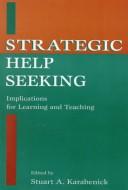| Listing 1 - 10 of 20 | << page >> |
Sort by
|

Abstract | Keywords | Export | Availability | Bookmark
 Loading...
Loading...Choose an application
- Reference Manager
- EndNote
- RefWorks (Direct export to RefWorks)
Help-seeking behavior --- Marriage counseling --- Married people

ISBN: 1282300210 9786612300219 1576755274 9781576755273 9781609944186 1609944186 9781282300217 9781576754511 1576754510 6612300213 Year: 2007 Publisher: San Francisco, Calif. Berrett-Koehler Publishers
Abstract | Keywords | Export | Availability | Bookmark
 Loading...
Loading...Choose an application
- Reference Manager
- EndNote
- RefWorks (Direct export to RefWorks)
There are 11.9 million single parents, and each year 50 million adults act as caregivers for chronically ill, disabled, or aged family members. Moreover, a significant percentage of today's 56 million knowledge workers (in the US alone) are overworked and need help. This guide can appeal to these people.
Help-seeking behavior. --- Assistance seeking behavior --- Behavior, Help seeking --- Seeking help --- Interpersonal relations
Book
ISBN: 9798885044905 Year: 2022 Publisher: [Place of publication not identified] : New Degree Press,
Abstract | Keywords | Export | Availability | Bookmark
 Loading...
Loading...Choose an application
- Reference Manager
- EndNote
- RefWorks (Direct export to RefWorks)
Business networks.. --- Help-seeking behavior. --- Mentoring in business.. --- E-books

ISBN: 0805823859 Year: 1998 Publisher: Mahwah Erlbaum
Abstract | Keywords | Export | Availability | Bookmark
 Loading...
Loading...Choose an application
- Reference Manager
- EndNote
- RefWorks (Direct export to RefWorks)
Help-seeking behavior --- Mastery learning --- Motivation in education --- Questioning --- Social interaction in children --- Teaching
Book
ISBN: 1804557102 1804557129 Year: 2023 Publisher: Bingley, UK : Emerald Publishing Limited,
Abstract | Keywords | Export | Availability | Bookmark
 Loading...
Loading...Choose an application
- Reference Manager
- EndNote
- RefWorks (Direct export to RefWorks)
This volume contains an Open Access Chapter Stuart A. Karabenick was a prolific scholar and a co-editor of the Advances in Motivation and Achievement book series. At the time of his passing on August 1st, 2020, he was a Professor Emeritus at Easter Michigan University and a Research-Professor Emeritus at the University of Michigan. Throughout his long career in Educational Psychology, Dr. Karabenick conducted research in several areas, and with dozens of collaborators. This volume memorializes Dr. Karabenick by asking some of his collaborators and former students to contribute chapters in the research topic that they worked on with him. The collection begins with a reprint of an article that was published just before Dr. Karabenick passed away, sharing the wisdom he had acquired during his long and distinguished career. The book contains three chapters about help- seeking - one of the topics that Dr. Karabenick examined most frequently in his research - followed by three chapters about teacher motivation and professional development. Next, there are chapters about self-regulation, another of Dr. Karabenick's favorite research topics. The volume culminates with chapters on a variety of topics: uses of technology to help foster student self-regulation, defining, measuring, and fostering a sense of relevance among students, and improving research through high-quality cognitive pretesting procedures. Volume 22 provides insights into the many contributions that Dr. Karabenick made to the field of Educational Psychology and the important role he played in the lives of his students, collaborators, and friends.
Teachers --- Help-seeking behavior. --- Educational psychology. --- Education --- Educational psychology. --- Psychology. --- Educational Psychology. --- Karabenick, Stuart A. --- Criticism and interpretation.
Book
ISBN: 3319573063 3319573055 Year: 2017 Publisher: Cham : Springer International Publishing : Imprint: Springer,
Abstract | Keywords | Export | Availability | Bookmark
 Loading...
Loading...Choose an application
- Reference Manager
- EndNote
- RefWorks (Direct export to RefWorks)
This timely and important collection broadens our understanding of the ways in which lay theories (also known as folk psychologies, implicit theories, naïve theories, or mindsets) impact our lives and social relations. Moving well beyond lay theories as applied to intelligence and achievement, this volume considers lay theories in an admirably wide context, including perspectives on prejudice, creativity, self-regulation, health, free will, justice, magic, religion and more. Eminent and emerging scholars alike provide a comprehensive overview that presents and synthesizes cutting edge contemporary research on lay theories, spanning social, cognitive, developmental, cultural, and clinical psychology. Structurally, this volume is organized in three parts. Beginning with a preface by renowned scholar Carol Dweck, the first part looks at the origins and nature of lay theories, and how malleable they are. The second part explores lay theories about common psychological phenomena. The third section discusses lay theories about the metaphysical or supernatural. Finally, the last section explores the important question of how lay theories impact health and health behavior. Taken together, the chapters provide an integrative survey of the science of lay theories, bringing together many perspectives that previously have been studied largely in isolation. This volume is more than the sum of its parts—perspectives from different strands of research provide insights that cut across research disciplines, making novel connections and prompting new directions for this field of study. Shedding light on how our beliefs shape all facets of our lives, The Science of Lay Theories: How Beliefs Shape Our Cognition, Behavior, and Health will appeal to researchers and practitioners in psychology, as well as philosophers, cognitive and developmental neuroscientists, religious scholars, sociologists, and anthropologists. It is very rare to say of an edited volume of scholarly chapters “I couldn’t put it down!” Yet that was the case with this book. It’s not just that I have worked in this field for many years, but rather, with every chapter I felt I was gaining new insights into what, deep down, people really believe and how these beliefs influence their lives—Carol Dweck, Stanford University, Palo Alto, CA, USA.
Psychology. --- Health psychology. --- Personality. --- Social psychology. --- Psychology and religion. --- Personality and Social Psychology. --- Religion and Psychology. --- Health Psychology. --- Help-seeking behavior. --- Mental health --- Mental health education --- Science. --- Health education --- Preventive mental health services --- Emotional health --- Mental hygiene --- Mental physiology and hygiene --- Happiness --- Health --- Public health --- Mental illness --- Psychiatry --- Psychology --- Psychology, Pathological --- Assistance seeking behavior --- Behavior, Help seeking --- Seeking help --- Interpersonal relations --- Consciousness. --- Psychology, clinical. --- Apperception --- Mind and body --- Perception --- Philosophy --- Spirit --- Self --- Religion and psychology --- Religion --- Health psychology --- Health psychology, Clinical --- Psychology, Clinical health --- Psychology, Health --- Salutogenesis --- Clinical psychology --- Medicine and psychology --- Mass psychology --- Psychology, Social --- Human ecology --- Social groups --- Sociology --- Personal identity --- Personality psychology --- Personality theory --- Personality traits --- Personology --- Traits, Personality --- Individuality --- Persons --- Temperament
Book
Year: 2022 Publisher: Basel MDPI - Multidisciplinary Digital Publishing Institute
Abstract | Keywords | Export | Availability | Bookmark
 Loading...
Loading...Choose an application
- Reference Manager
- EndNote
- RefWorks (Direct export to RefWorks)
This Special Issue gathers a wide range of investigations that focus on mental health promotion activities and initiatives for refugees and other culturally and/or linguistically diverse migrant populations.
Refugees --- Humanities --- Social interaction --- Mental health --- psychology. --- refugee women --- post-traumatic stress disorder (PTSD) --- traumatic experiences --- sexual violence --- systematic review --- refugee --- adolescent --- assessment --- screening --- PTSD --- interpreter --- religious and community leaders --- Arabic-speaking --- refugees --- stigma --- mental illness --- asylum seekers --- Eritrea --- Sudan --- trauma --- mental health care --- mental health --- help-seeking --- physical health --- structural barriers --- trauma exposure --- acculturation --- discrimination --- privacy --- mindfulness-based intervention --- stress management --- mental health promotion --- stepped care model --- evaluation --- migrant --- Arabic speakers --- Bangla speakers --- Muslim --- cultural adaptation --- mentoring --- migrants --- women --- empowerment --- employability --- migration --- transit --- MHPSS --- Delphi method --- asylum seeker --- resettlement --- health assessment --- South Asian --- physical activity --- immigrants --- primary healthcare access --- settlement service organizations --- health equity
Book
Year: 2021 Publisher: Basel, Switzerland MDPI - Multidisciplinary Digital Publishing Institute
Abstract | Keywords | Export | Availability | Bookmark
 Loading...
Loading...Choose an application
- Reference Manager
- EndNote
- RefWorks (Direct export to RefWorks)
Intimate partner violence (IPV), defined as physical, sexual, emotional, and economic abuse and controlling behaviors inflicted within intimate partner relationships, is a global crisis that extends beyond national and sociocultural boundaries, affecting people of all ages, religions, ethnicities, and economic backgrounds. Though studies exist that seek to explain how people become trapped within violent relationships and what factors facilitate survival, escape and safety, this book provides fresh insights into this complex and multifaceted issue. People often ask of women in abusive relationships “why does she stay?” Critics suggest that this question carries implicit notions of victim blame and fails to hold to account the perpetrators of abuse. The studies described in this book, however, explore the question from the perspectives of survivors and represent a shift away from individual pathology to an approach based on the recognition of structural oppression, agency and resilience. Comprising eight chapters, new theoretical frameworks for the analysis of IPV are provided to guide practitioners and policy makers in improving services for vulnerable people in abusive relationships, and a range of studies into the experiences of a diverse range of survivors, including mothers in Portugal, women who experienced child marriage in Uganda, and refugees in the United States of America, generate findings which elucidate perspectives from marginalised and under-researched groups.
Psychology --- intimate partner violence --- domestic violence --- theory --- trauma --- intersectionality --- human rights --- dating violence (DV) --- victims of dating violence --- young people --- leave abusive relationships --- stay in abusive relationships --- help-seeking --- adolescent sexting --- prosocial adolescent behavior --- teen dating violence (TDV) --- educational policy --- educational leadership --- sex education curriculum --- women of South Asian heritage --- intimate partner violence (IPV) --- choosing own partner --- UK --- leaving an intimate relationship --- child marriage --- girls --- leaving violent relationships --- survivor --- Uganda --- women --- mother --- victims --- leave or stay --- refugees --- cultural competence --- organizational cultural responsiveness --- diverse populations --- codependency --- gender violence --- crime --- prison
Book
Year: 2021 Publisher: Basel, Switzerland MDPI - Multidisciplinary Digital Publishing Institute
Abstract | Keywords | Export | Availability | Bookmark
 Loading...
Loading...Choose an application
- Reference Manager
- EndNote
- RefWorks (Direct export to RefWorks)
Intimate partner violence (IPV), defined as physical, sexual, emotional, and economic abuse and controlling behaviors inflicted within intimate partner relationships, is a global crisis that extends beyond national and sociocultural boundaries, affecting people of all ages, religions, ethnicities, and economic backgrounds. Though studies exist that seek to explain how people become trapped within violent relationships and what factors facilitate survival, escape and safety, this book provides fresh insights into this complex and multifaceted issue. People often ask of women in abusive relationships “why does she stay?” Critics suggest that this question carries implicit notions of victim blame and fails to hold to account the perpetrators of abuse. The studies described in this book, however, explore the question from the perspectives of survivors and represent a shift away from individual pathology to an approach based on the recognition of structural oppression, agency and resilience. Comprising eight chapters, new theoretical frameworks for the analysis of IPV are provided to guide practitioners and policy makers in improving services for vulnerable people in abusive relationships, and a range of studies into the experiences of a diverse range of survivors, including mothers in Portugal, women who experienced child marriage in Uganda, and refugees in the United States of America, generate findings which elucidate perspectives from marginalised and under-researched groups.
intimate partner violence --- domestic violence --- theory --- trauma --- intersectionality --- human rights --- dating violence (DV) --- victims of dating violence --- young people --- leave abusive relationships --- stay in abusive relationships --- help-seeking --- adolescent sexting --- prosocial adolescent behavior --- teen dating violence (TDV) --- educational policy --- educational leadership --- sex education curriculum --- women of South Asian heritage --- intimate partner violence (IPV) --- choosing own partner --- UK --- leaving an intimate relationship --- child marriage --- girls --- leaving violent relationships --- survivor --- Uganda --- women --- mother --- victims --- leave or stay --- refugees --- cultural competence --- organizational cultural responsiveness --- diverse populations --- codependency --- gender violence --- crime --- prison
Book
Year: 2022 Publisher: Basel MDPI - Multidisciplinary Digital Publishing Institute
Abstract | Keywords | Export | Availability | Bookmark
 Loading...
Loading...Choose an application
- Reference Manager
- EndNote
- RefWorks (Direct export to RefWorks)
This Special Issue gathers a wide range of investigations that focus on mental health promotion activities and initiatives for refugees and other culturally and/or linguistically diverse migrant populations.
Refugees --- Mental health --- psychology. --- refugee women --- post-traumatic stress disorder (PTSD) --- traumatic experiences --- sexual violence --- systematic review --- refugee --- adolescent --- assessment --- screening --- PTSD --- interpreter --- religious and community leaders --- Arabic-speaking --- refugees --- stigma --- mental illness --- asylum seekers --- Eritrea --- Sudan --- trauma --- mental health care --- mental health --- help-seeking --- physical health --- structural barriers --- trauma exposure --- acculturation --- discrimination --- privacy --- mindfulness-based intervention --- stress management --- mental health promotion --- stepped care model --- evaluation --- migrant --- Arabic speakers --- Bangla speakers --- Muslim --- cultural adaptation --- mentoring --- migrants --- women --- empowerment --- employability --- migration --- transit --- MHPSS --- Delphi method --- asylum seeker --- resettlement --- health assessment --- South Asian --- physical activity --- immigrants --- primary healthcare access --- settlement service organizations --- health equity
| Listing 1 - 10 of 20 | << page >> |
Sort by
|

 Search
Search Feedback
Feedback About UniCat
About UniCat  Help
Help News
News